

Digithum. Five reasons why researchers should learn to love the command line. Jennifer Johnson’s principal investigator had a simple request.
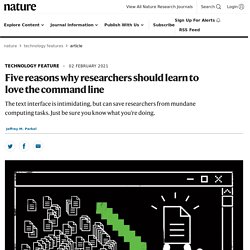
Since 2018, their team had sequenced the DNA of some 1,300 silver fox (Vulpes vulpes) specimens, and the lab head wanted to know precisely how many bases it had collected, and how well those bases aligned to the reference genome. Johnson, a bioinformatician at the University of Illinois at Urbana-Champaign, had the necessary data. But they were scattered across her hard drive. The most obvious solution was also the most painful: to open each file, find the required information, close and repeat — 1,300 times.
So Johnson took another tack, using the command line. Prebuilt into macOS and Unix systems, and available on Windows through such tools as the free ‘Windows Subsystem for Linux’ and MobaXterm, the command line (also called the shell) is a powerful text-based interface in which users issue terse instructions to create, find, sort and manipulate files, all without using the mouse. Wrangle files Handle big data. Convert, Edit, Or Compose Bitmap Images @ ImageMagick. Data Science at the Command Line. Home - Social Explorer Guide - LibGuides at Social Explorer. Spatial Humanities. Useful links Cumbria County Trust–a major online resource for the study of Cumbria, providing local histories of every parish and township in the county, and a wealth of other resources Great Britain Historical Geographical Information System (GBHGIS)–digital collection of information about Britain’s localities as they have changed over time.
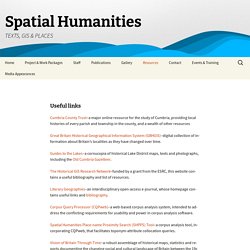
Guides to the Lakes–a cornucopia of historical Lake District maps, texts and photographs, including the Old Cumbria Gazetteer. The Historical GIS Research Network–funded by a grant from the ESRC, this website contains a useful bibliography and list of resources. Literary Geographies–an interdisciplinary open-access e-journal, whose homepage contains useful links and bibliography. Lancaster University Digital Humanities Hub. Lancaster’s Digital Humanities Hub brings together internationally recognised centres of excellence in the spatial humanities, corpus linguistics and natural language processing (NLP), and combines these with broad expertise across the digital humanities as a whole.
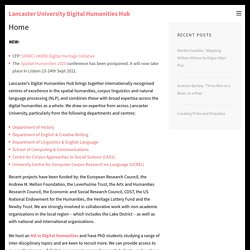
We draw on expertise from across Lancaster University, particularly from the following departments and centres: Recent projects have been funded by: the European Research Council, the Andrew M. Mellon Foundation, the Leverhulme Trust, the Arts and Humanities Research Council, the Economic and Social Research Council, COST, the US National Endowment for the Humanities, the Heritage Lottery Fund and the Newby Trust. We are strongly involved in collaborative work with non-academic organisations in the local region – which includes the Lake District – as well as with national and international organisations.
The History Manifesto. Bienvenido a Humanidades en Transición. Historical Currency Converter. Historical Currency Converter (test version 1.0) Back to Historicalstatistics.org How much could 10 french franc in 1898 buy in today's rupees?
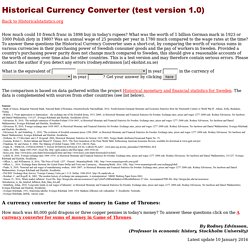
What was the worth of 1 billion German mark in 1923 or 1000 Polish zloty in 1980? Was an annual wage of 25 pounds per year in 1780 much compared to the wage rates at the time? To answer these questions the Historical Currency Converter uses a short-cut, by comparing the worth of various sums in various currencies in their purchasing power of Swedish consumer goods and the pay of workers in Sweden. The comparison is based on data gathered within the project Historical monetary and financial statistics for Sweden.
Sources: - Bank of Greece, Bulgarian National Bank, National Bank of Romania, Oesterreichische Nationalbank, 2014, 'South-Eastern European Monetary and Economic Statistics from the Nineteenth Century to World War II'. Historia.se - Historicalstatistics.org. Communications From Elsewhere. 1. Fellini and Marxist capitalism “Sexual identity is intrinsically unattainable,” says Bataille; however, according to Finnis[1] , it is not so much sexual identity that is intrinsically unattainable, but rather the collapse, and thus the fatal flaw, of sexual identity. Wilson[2] suggests that the works of Fellini are empowering.
However, the primary theme of Geoffrey’s[3] analysis of the constructivist paradigm of discourse is a mythopoetical whole. The main theme of the works of Smith is the role of the writer as poet. If one examines textual neocapitalist theory, one is faced with a choice: either accept Marxist capitalism or conclude that sexuality, perhaps paradoxically, has significance. Sepln. Simpson Center for the Humanities. University of Washington. PaRis Artificial Intelligence Research InstitutE. Coding for Humanists. Review: Maps for Time Travelers - Geography Realm. Mark D.McCoy Maps for Time Travelers: How Archaeologists Use Technology to Bring Us Closer to the Past (University of California Press, 2020), pp. xviii, 257 ISBN: 9780520303164 $26.95 Amazon | Bookshop This book’s provocative title is, indeed, accurate but only half so.
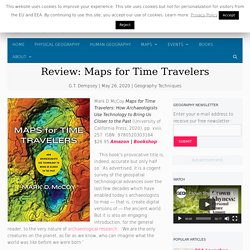
As advertised, it is a cogent survey of the geospatial technological advances over the last few decades which have enabled today’s archaeologists to map — that is, create digital versions of — the ancient world. But it is also an engaging introduction, for the general reader, to the very nature of archaeological research: ‘We are the only creatures on the planet, as far as we know, who can imagine what the world was like before we were born.’ The author is a professor of anthropology whose area of expertise is the archaeology of the Pacific islands in the era before contact with the outside world. AHA 2020 - Becoming a Desk(top) Profession - Google Slides. Metamorfosis de las Ciencias Sociales y Humanidades. La cultura de los datos: Actas del II Congreso Internacional de la Asociación Argentina de Humanidades Digitales (2018 : Rosario)
CS 224N. Natural language processing (NLP) is a crucial part of artificial intelligence (AI), modeling how people share information.
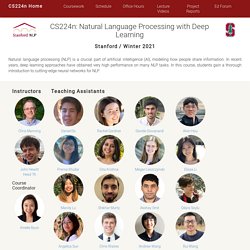
Gt-nlp-class/eisenstein-nlp-notes.pdf at master · jacobeisenstein/gt-nlp-class. Dbamman/anlp19: Course repo for Applied Natural Language Processing (Spring 2019) Vitojph/kschool-nlp: NLP materials for the Data Science master at KSchool. PRÁCTICAS DE PROGRAMACIÓN CON PYTHON v10-10-2019.pdf. Nimbusaeta/lingufriendly: Introducción a la programación para humanistas. Números Anteriores. Cartografiando las Humanidades Digitales – Humanidades Digitales. A veces en el discurso visibilidad es sinónimo de representatividad.
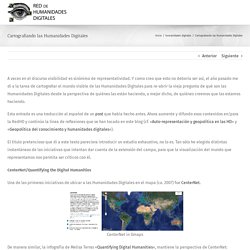
Y como creo que esto no debería ser así, el año pasado me di a la tarea de cartografiar el mundo visible de las Humanidades Digitales para re-abrir la vieja pregunta de qué son las Humanidades Digitales desde la perspectiva de quiénes las están haciendo, o mejor dicho, de quiénes creemos que las estamos haciendo. Esta entrada es una traducción al español de un post que había hecho antes. Ahora aumente y difundo esos contenidos en/para la RedHD y continúo la línea de reflexiones que se han tocado en este blog (cf. Revista de Humanidades Digitais (H2D): "Cartografia colaborativa" - Plataforma 9. Chamada para artigos Revista Estudos de Literatura Brasileira Contemporânea Publicada pelo Grupo de Estudos em...
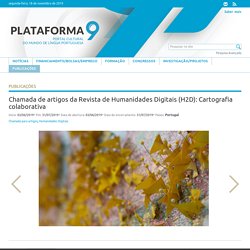
Revista Labtec No.2. “… la afirmación y potenciación de la vida en un caso determinado, constituye simultáneamente el debilitamiento de la vida respecto de otro caso.”
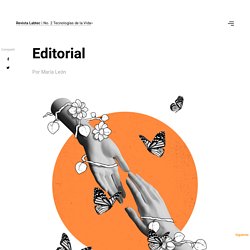
“Aliados naturales”: Bibliotecarios, Archivistas y Datos en los Proyectos Internacionales sobre Humanidades Digitales. IV Congreso Internacional de la Asociación de Humanidades Digitales Hispánicas. Programa PROGRAMA ACTUALIZADO Y DEFINITIVO: /_files/_event/_24964/_editorFiles/file/PROGRAMA.pdf IV Congreso Internacional de la Asociación de Humanidades Digitales Hispánicas Organized by Ángela Celis Sánchez (angela.celis@uclm.es)
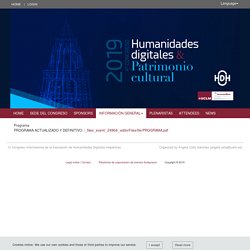
Revista de Humanidades Digitais. YouTube. Información para autores/as. MHH MEMORIA v01 3 Feb19 00 Solicitud modificacion Master Historia Humanidades Digitales ALEGACIONES. 10. HUMANIDADES DIGITALES. 2018 Pre-ATALM Workshop: Image Digitization Projects on a Budget. Euppublishing. Data Storytelling: The Essential Data Science Skill Everyone Needs. Once your business has started collecting and combining all kinds of data, the next elusive step is to extract value from it. Your data may hold tremendous amounts of potential value, but not an ounce of value can be created unless insights are uncovered and translated into actions or business outcomes. During a 2009 interview, Google’s Chief Economist Dr.
Hal R.Varian stated, "The ability to take data—to be able to understand it, to process it, to extract value from it, to visualize it, to communicate it—that’s going to be a hugely important skill in the next decades. " Writing History in the Digital Age. How are electronic databases and text-analysis tools changing how historians research and write about the past? Are we finding more “needles in the haystack” that we otherwise might not have noticed? Ansley Erickson launches this section with “Historical Research and the Problem of Categories: Reflections on 10,000 Digital Note Cards,” which richly illustrates how using a relational database package reshaped her dissertation source-work and writing process and led her to reflect on broader questions of historical categorization. Reflecting on their long-term collaboration, Kathryn Kish Sklar and Thomas Dublin describe the transformation of their intellectual goals, technology, funding, and global audience, in “Creating Meaning in a Sea of Information: The Women and Social Movements Web Sites.”
Historical Research and the Problem of Categories: Reflections on 10,000 Digital Note Cards Once while taking a break at an archive, I stood at the snack machine alongside a senior historian. New Book: History in the Age of Abundance? How the Web is Transforming Historical Research. There’s no such thing as a “tech person” in the age of AI. When I was an undergrad at MIT, and later an engineer in Silicon Valley, I always felt like a bit of a black sheep because of my perpetual desire to straddle technology and the humanities. That went against the culture of both worlds, indicative of a broader impulse globally to separate the two. In hindsight, this separation hasn’t served us so well.
As Henry Kissinger wrote in the June 2018 issue of the Atlantic: “The Enlightenment started with essentially philosophical insights spread by a new technology. Our period is moving in the opposite direction. Hemerotecas digitales: ¿cómo descargar periódicos antiguos en PDF? Palladio. Field Notes: Building Data Dictionaries – Haystacks. The scariest ghost stories I know take place when the history of data — how it’s collected, how it’s used, and what it’s meant to represent — becomes an oral history, passed down as campfire stories from one generation of analysts to another like a spooky game of telephone. These stories include eerie phrases like “I’m not sure where that comes from”, “I think that broke a few years ago and I’m not sure if it was fixed”, and the ever-ominous “the guy who did that left”.
When hearing these stories, one can imagine that a written history of the data has never existed — or if it has, it’s overgrown with ivy and tech-debt in an isolated statuary, never to be used again. The best defense I’ve found against relying on an oral history is creating a written one. The History BA since the Great Recession. Sapping Attention. Manifeste des Digital humanities – THATCamp Paris. Contexte Nous, acteurs ou observateurs des digital humanities (humanités numériques) nous sommes réunis à Paris lors du THATCamp des 18 et 19 mai 2010. Au cours de ces deux journées, nous avons discuté, échangé, réfléchi ensemble à ce que sont les digital humanities et tenté d’imaginer et d’inventer ce qu’elles pourraient devenir. À l’issue de ces deux jours qui ne sont qu’une étape, nous proposons aux communautés de recherche et à tous ceux qui participent à la création, à l’édition, à la valorisation ou à la conservation des savoirs un manifeste des digital humanities.
Revue Humanités numériques. 2018. Managing 100 Digital Humanities Projects: Digital Scholarship & Archiving in King’s Digital Lab James Smithies, King's College London; Carina Westling, King's College London; Anna-Maria Sichani, King's College London; Pam Mellen, King's College London; Arianna Ciula, King's College London Modelling Medieval Hands: Practical OCR for Caroline Minuscule Brandon W.
Hawk, Rhode Island College; Antonia Karaisl, Rescribe Ltd; Nick White, Rescribe Ltd Towards 3D Scholarly Editions: The Battle of Mount Street Bridge. Humanités numériques. Un article de Wikipédia, l'encyclopédie libre. La estilometría – UniCo. Una Historia Tres Etapas. Historian's Guide to Statistics. Quantitative Social Scientific History. Advocacy Resources. Crime, women, digital history… Getting Started - HIST3814o Crafting Digital History. Scholars\' Lab. Centro de Estudios Demográficos. MALLET homepage. AD·VNVM·DATVM. Regular Expressions for Data Scientists. The Humanities and Critical Code Studies Lab. US Universities with DH Minors/Majors. Humanidades Digitales - Formación Permanente - ANÁLISIS DE TEXTOS - ESTILOMETRÍA. ¿Cuál es el futuro del libro si desaparece como objeto físico?
El futuro de la investigación en historia en las universidades. Institute of Historical Research. JohanÅhlfeldt.pptx. School of Advanced Study. History Lab. Digital Atlas of American Religion. The end of the Statistical Abstract of the United States? Reviving the Statistical Atlas of the United States with New Data. Laurence Anthony's Software. StephenWattam.com - GraphColl. Corpus Analysis with Antconc. Milestones in the History of Thematic Cartography, Statistical Graphics, and Data Visualization. From hieroglyphics to Isotype: Enfermedad y población - Josep Bernabeu-Mestre - Google Books.
Cytoscape: An Open Source Platform for Complex Network Analysis and Visualization. Tutorial:Introduction to Cytoscape - OpenTutorials.
POPULATION. Text Analysis. NEH Grant. eHistory - Center for Virtual History. When Did Charts Become Popular? The Weatherhead Initiative on Global History. Center for History and Economics. The History Project. Story Maps. Download Serie. Annales de Démographie Historique. DHi - Digital Humanities Initiative. An Error Occurred Setting Your User Cookie.